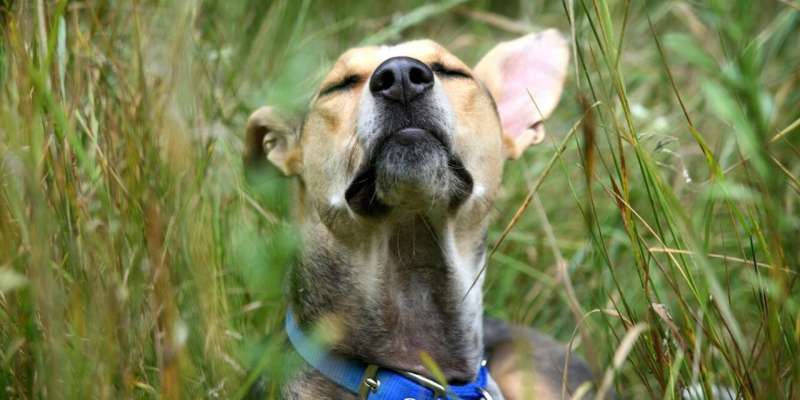Science
Enhance Your Dog’s Life: Six Engaging Ways to Enrich Their World

Dogs experience the world primarily through their sense of smell, engaging with their surroundings in ways that humans often overlook. A recent study published in Applied Animal Behaviour Science emphasizes the importance of scent in enriching dogs’ lives. Researchers found that specific scents can significantly reduce stress and boredom in dogs while enhancing their overall well-being. Based on these findings, there are six effective methods to provide scent enrichment for dogs, which can be easily implemented by pet owners.
1. Engaging in Scent Work
Scent work classes have surged in popularity, allowing dogs to learn how to identify and locate hidden scents. This activity not only increases a dog’s focus but also fosters a sense of optimism. Unlike agility sports, scent work has shown to be particularly beneficial for mental stimulation. Many dogs trained in these classes have contributed to citizen science projects by locating invasive pests and aiding in wildlife research. Additionally, owners can teach their dogs to find everyday items like phones or keys, making scent work a practical and enjoyable activity.
2. Sniff-Based Walks
Another enriching option is to take dogs on “sniffaris,” which are walks that prioritize exploration through scent rather than social interaction. These walks allow dogs to safely investigate their environment, reading the “local news” through odors left by other animals. This activity is low-cost and easy to implement, and many trainers recommend creating designated sniff spaces or parks to enhance the experience further.
Scent exploration provides dogs with mental stimulation, and it’s a straightforward method for caregivers to enrich their dogs’ daily routines.
3. Creating a Scent-Enriched Home Environment
Incorporating various scents into a dog’s living space can encourage exploration and provide behavioral benefits. Introducing animal scents, such as straw bedding or feathers, can stimulate curiosity without the risk of ingestion. Plant-based scents, including diluted lavender oil or vanilla essence, can also promote relaxation, leading to a calmer dog. Caregivers should ensure that any scents introduced are safe and appropriate for their pets.
4. Cultivating Sensory Gardens
Creating sensory gardens filled with dog-friendly herbs and plants can further enrich a pet’s environment. Herbs such as rosemary, basil, and catnip provide not only pleasant scents but also opportunities for dogs to engage with their surroundings. Before planting, pet owners should consult with veterinarians to confirm that chosen plants are safe for their dogs.
5. Implementing Scatter Search Feeding
Scatter search feeding turns mealtime into a treasure hunt. By hiding food in various locations—such as in grass or among leaves—dogs are encouraged to use their noses to find their meals. This method requires some initial training where owners guide their pets in understanding the game. Once familiar, dogs will enjoy the challenge of searching for their food.
6. Playing Scent Engagement Games
Finally, scent engagement games provide indoor stimulation for dogs. Utilizing items like snuffle mats or cardboard boxes, caregivers can hide treats or toys, creating an exciting scavenger hunt. These games not only offer mental enrichment but also strengthen the bond between dogs and their owners through interactive play.
The benefits of incorporating scent-based activities into a dog’s routine are clear. These methods are not only simple but also provide significant mental stimulation, fostering a happier and healthier pet. As awareness of the importance of scent in dogs’ lives increases, more pet owners are discovering the joy of enhancing their dogs’ experiences through these engaging activities.
-

 Top Stories1 week ago
Top Stories1 week agoMarc Buoniconti’s Legacy: 40 Years Later, Lives Transformed
-

 Politics3 weeks ago
Politics3 weeks agoDallin H. Oaks Assumes Leadership of Latter-day Saints Church
-

 Sports3 weeks ago
Sports3 weeks agoSteve Kerr Supports Jonathan Kuminga After Ejection in Preseason Game
-

 Business3 weeks ago
Business3 weeks agoTyler Technologies Set to Reveal Q3 2025 Earnings on October 22
-

 Science3 weeks ago
Science3 weeks agoChicago’s Viral ‘Rat Hole’ Likely Created by Squirrel, Study Reveals
-

 Lifestyle3 weeks ago
Lifestyle3 weeks agoKelsea Ballerini Launches ‘Burn the Baggage’ Candle with Ranger Station
-

 Lifestyle3 weeks ago
Lifestyle3 weeks agoDua Lipa Celebrates Passing GCSE Spanish During World Tour
-

 Entertainment3 weeks ago
Entertainment3 weeks agoZoe Saldana Advocates for James Cameron’s Avatar Documentary
-

 Health3 weeks ago
Health3 weeks agoRichard Feldman Urges Ban on Menthol in Cigarettes and Vapes
-

 Health3 weeks ago
Health3 weeks agoCommunity Unites for Seventh Annual Mental Health Awareness Walk
-

 Business3 weeks ago
Business3 weeks agoMega Millions Jackpot Reaches $600 Million Ahead of Drawings
-

 World3 weeks ago
World3 weeks agoD’Angelo, Iconic R&B Singer, Dies at 51 After Cancer Battle








